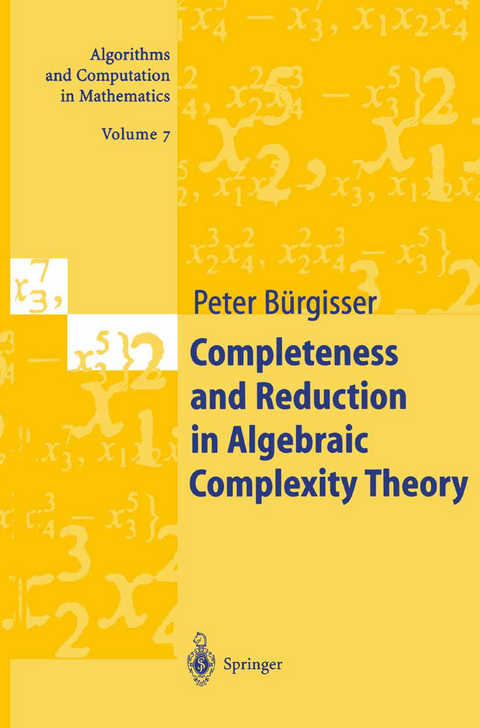
Completeness and Reduction in Algebraic Complexity Theory
Springer Berlin (Verlag)
978-3-642-08604-5 (ISBN)
Peter Bürgisser is an internationally recognized expert in complexity theory. He is associate editor of the journal Computational Complexity and he was invited speaker at the 2010 International Congress Mathematicians.
1 Introduction.- 2 Valiant's Algebraic Model of NP-Completeness.- 3 Some Complete Families of Polynomials.- 4 Cook's versus Valiant's Hypothesis.- 5 The Structure of Valiant's Complexity Classes.- 6 Fast Evaluation of Representations of General Linear Groups.- 7 The Complexity of Immanants.- 8 Separation Results and Future Directions.- References.- List of Notation.
".... The subject matter of the book is not easy, since it involves prerequisites from several areas, among them complexity theory, combinatorics, analytic number theory, and representations of symmetric and general linear groups. But the author goes to great lengths to motivate his results, to put them into perspective, and to explain the proofs carefully. In summary, this monograph advances its area of algebraic complexity theory, and is a must for people for working on this subject. And it is a pleasure to read."
Joachim von zur Gathen, Mathematical Reviews, Issue 2001g
| Erscheint lt. Verlag | 4.12.2010 |
|---|---|
| Reihe/Serie | Algorithms and Computation in Mathematics |
| Zusatzinfo | XII, 168 p. |
| Verlagsort | Berlin |
| Sprache | englisch |
| Maße | 155 x 235 mm |
| Gewicht | 287 g |
| Themenwelt | Mathematik / Informatik ► Informatik ► Theorie / Studium |
| Mathematik / Informatik ► Mathematik ► Algebra | |
| Mathematik / Informatik ► Mathematik ► Analysis | |
| Mathematik / Informatik ► Mathematik ► Wahrscheinlichkeit / Kombinatorik | |
| Schlagworte | Algebra • Complexity • Complexity theory • Notation • np-completeness |
| ISBN-10 | 3-642-08604-7 / 3642086047 |
| ISBN-13 | 978-3-642-08604-5 / 9783642086045 |
| Zustand | Neuware |
| Informationen gemäß Produktsicherheitsverordnung (GPSR) | |
| Haben Sie eine Frage zum Produkt? |
aus dem Bereich


